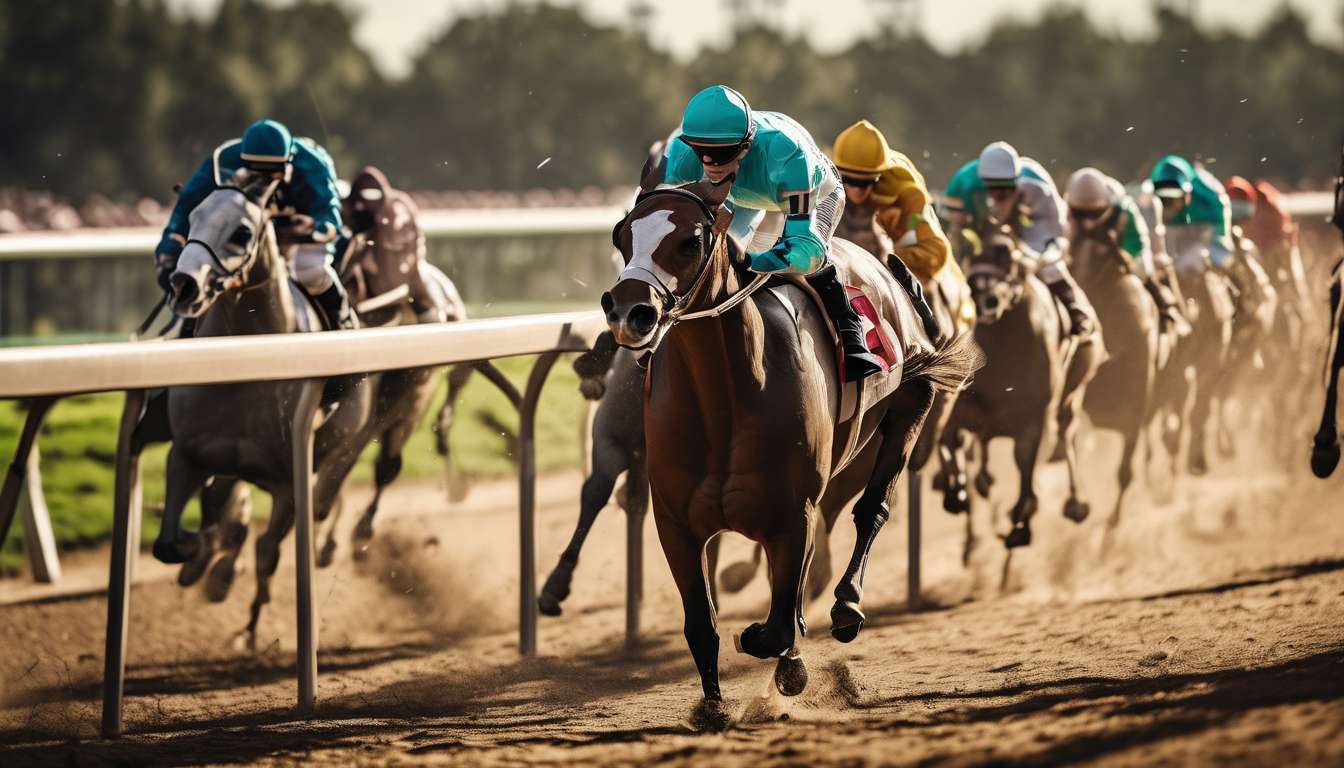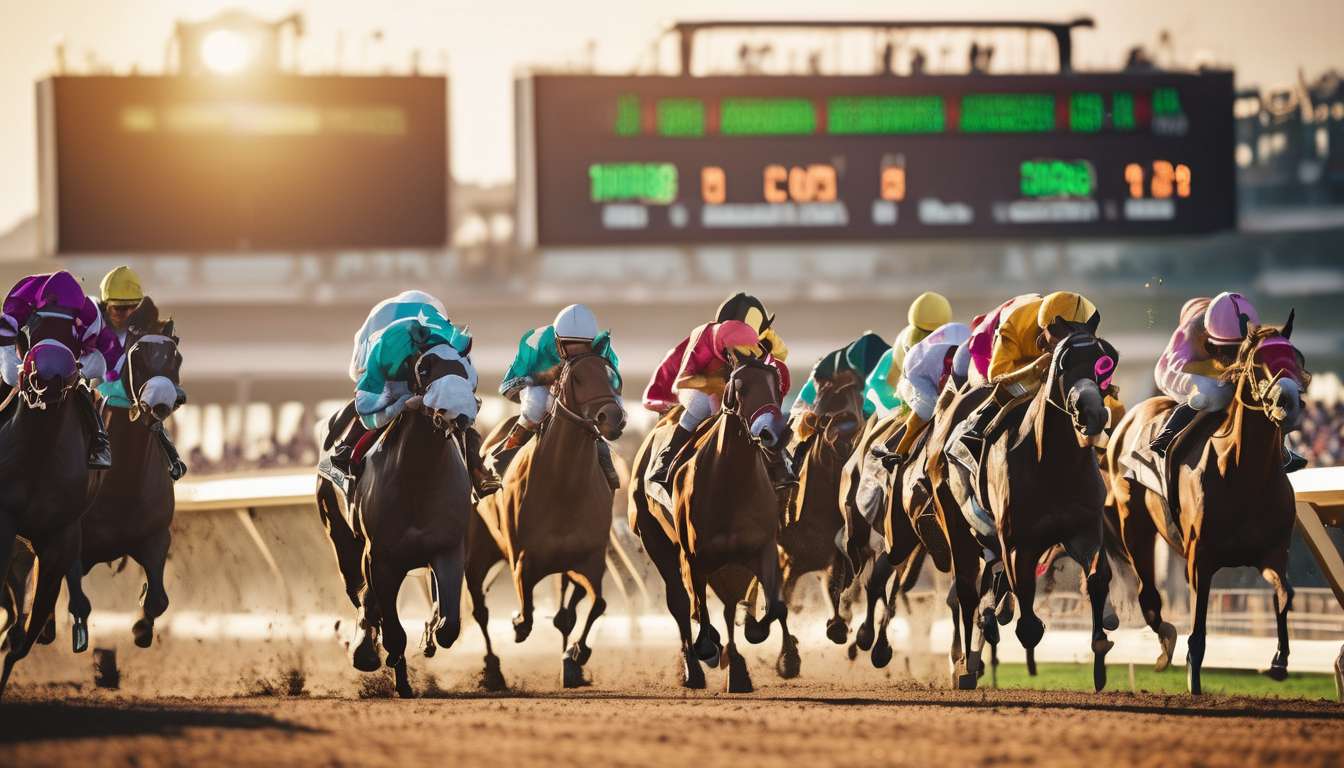In the exhilarating world of horse racing, making informed betting decisions requires more than just a hunch or a favorite horse’s name. We find ourselves at the intersection of tradition and technology, where data-driven approaches can significantly enhance our betting strategies.
As enthusiasts eager to refine our picks, we understand the importance of leveraging the right data sources to gain an edge over the competition. Our journey begins with exploring nine indispensable data sources that offer insights into:
- Horses’ past performances
- Track conditions
- Jockey statistics
- And more
By tapping into these resources, we aim to transform our betting experiences from mere guesses to calculated predictions.
Together, we’ll navigate through an array of information, distilling complex data into practical knowledge that empowers us to make smarter bets. Join us as we delve into these sources and unlock the potential to elevate our horse betting prowess, ensuring each wager is a step closer to success.
Past Performances Analysis
Analyzing past performances gives us a crucial edge in predicting a horse’s future racing success. By diving into historical data, we unveil patterns that connect us to a community of informed bettors who appreciate the nuances of the sport.
We understand that a horse’s previous races aren’t just numbers on a page; they’re stories of triumphs and challenges that inform our next moves.
Key Aspects of Past Performances:
-
Track Conditions:
- Understanding a horse’s adaptability to different track conditions can dramatically influence race outcomes.
- Whether a track is muddy or firm, knowing a horse’s history with such surfaces empowers us to make smarter bets.
-
Jockey Performance:
- Recognizing which jockeys consistently excel with certain horses allows us to align our bets with those who’ve proven their mettle.
Together, by examining these elements, we forge a sense of camaraderie and shared insight, enhancing our collective betting experience.
Track Conditions Evaluation
We’re diving into how the nuances of track surfaces can significantly alter race dynamics and inform our betting strategies. Understanding track conditions isn’t just about whether it’s muddy or dry; it’s about how these conditions interact with each horse’s past performances.
Key Considerations:
-
Horse Performance History:
- Consider how well a horse has run under similar conditions before, as this can be a strong indicator of future success.
-
Track Surface Analysis:
- Scrutinize each horse’s history, focusing on performances on different surfaces—dirt, turf, or synthetic.
- This analysis reveals patterns and helps us make more informed bets.
-
Jockey Performance:
- Factor in how track conditions might affect jockey performance.
- Jockeys have varying skills and experience levels on different surfaces, impacting race outcomes.
By evaluating these elements collectively, we enhance our betting strategies. This shared knowledge strengthens our sense of community and gives us a competitive edge, making us feel connected and empowered in our pursuit of smarter bets.
Jockey Performance Metrics
To sharpen our betting strategies, we need to delve into the various metrics that evaluate a jockey’s performance across different race conditions. By examining past performances, we can uncover patterns and trends that may give us an edge.
A jockey’s ability to adapt to varying track conditions is crucial, and their historical success or struggle on certain surfaces can significantly influence race outcomes.
In our community of horse racing enthusiasts, understanding jockey performance isn’t just about raw statistics; it’s about feeling the pulse of the race. We consider:
- Win percentages
- Top finishes
- Performance under pressure
Key questions include:
- Are they consistent?
- Do they thrive on muddy tracks?
- Do they excel on dry, fast ones?
By combining these insights with our collective knowledge, we can make informed bets that reflect not just numbers but a shared passion for the sport. Together, we transform data into a winning strategy, celebrating victories as a united front.
Trainer Success Rates
In assessing trainer success rates, we focus on the crucial role trainers play in preparing horses to perform at their peak. A trainer’s track record is particularly telling, especially when considering past performances.
Key Aspects to Consider:
-
Consistent Winners:
- Have trainers consistently prepped winners?
- Reviewing their history helps us understand their strategies and adaptability.
-
Track Conditions:
- Some trainers excel in specific track conditions, such as muddy or fast tracks.
- They tailor their training to meet the demands of each environment.
- Observing how trainers adjust their methods based on these variables reveals patterns.
The synergy between trainer and jockey performance is essential. Trainers who work closely with jockeys often produce better results. This harmony can be the difference between a solid bet and a missed opportunity.
By understanding these elements, we strengthen our community of informed bettors, all seeking that edge that connects us to the thrill of the race.
Breeding and Pedigree Data
Understanding a horse’s breeding and pedigree is crucial for predicting its potential performance on the track.
As a community of savvy bettors, we know that a horse’s lineage offers insights into its:
- Speed
- Stamina
- Adaptability to different track conditions
By examining the past performances of a horse’s ancestors, we can gauge how it might fare in similar racing environments. Pedigree analysis tells us if a horse is likely to excel on turf or dirt, and this insight is invaluable when considering race conditions and surfaces.
Moreover, our shared knowledge of successful bloodlines often aligns with jockey performance. Top jockeys tend to choose mounts with proven pedigree strengths, as they too understand the advantages of superior breeding.
When we combine pedigree insights with jockey performance data, we create a fuller picture of a horse’s potential.
Together, we can make informed betting decisions that reflect our collective expertise and passion for the sport, strengthening our bond as a community.
Speed and Pace Figures
Speed and Pace Figures
Speed and pace figures provide a quantitative edge by measuring a horse’s performance relative to others in the race. These figures help us:
- Identify patterns in past performances
- Assess consistency
By relying on solid data rather than guesswork, we feel more connected to the sport and make informed decisions.
Track Conditions
Track conditions can significantly impact a horse’s speed. For example, a muddy track might slow down a typically fast horse, skewing its speed figures. By factoring in these conditions, we gain a better understanding of how a horse might perform on race day.
Jockey Performance
Jockey performance is crucial in influencing a horse’s pace. A skilled jockey can optimize each stride, affecting the overall outcome. By analyzing jockey statistics alongside speed figures, we create a comprehensive picture of potential race outcomes.
Comprehensive Analysis for Smarter Bets
By combining:
- Speed and pace figures
- Past performances
- Track conditions
- Jockey performance
we are empowered to make smarter bets. This holistic approach brings us closer to the heart of the racing community.
Betting Market Trends
Understanding betting market trends helps us identify value bets and stay ahead of the competition. By analyzing past performances, we can uncover patterns that others might overlook.
When we examine how horses have fared under similar track conditions, it provides insights that deepen our collective understanding and strengthens our community of savvy bettors.
Jockey performance plays a crucial role in betting strategies:
- A jockey’s skill can significantly influence a horse’s race outcome.
- Staying updated on their recent form gives us an edge in evaluating betting odds.
- By sharing these insights, we create a network of informed punters who appreciate the nuances of the sport.
Monitoring shifts in betting odds leading up to a race is essential:
- These fluctuations often reflect the collective wisdom of the betting market.
- By interpreting these changes, we can identify potential opportunities.
With a collaborative approach, we can make smarter, data-driven decisions and enhance our collective success at the track.
Injury and Health Reports
Monitoring injury and health reports is essential for making informed betting decisions. As a community that thrives on shared insights, we know that a horse’s physical condition can significantly impact its past performances.
If a horse has recently recovered from an injury, it might not perform at its best, regardless of favorable track conditions. We should always keep an eye on these reports to ensure we’re not caught off guard on race day.
Understanding the health status of a horse allows us to evaluate jockey performance more accurately. A skilled jockey might struggle if the horse isn’t in peak condition. Together, we can analyze how injury reports correlate with both the horse’s and jockey’s past performances. This analysis helps us anticipate how they might perform under current track conditions.
Let’s stay informed and share insights, enhancing our collective knowledge. Together, we’ll make smarter betting picks, strengthening our community’s reputation for savvy decision-making.
What are the best online platforms or tools to access comprehensive horse betting data?
We’ve found some great online platforms and tools to access comprehensive horse betting data. These resources provide valuable insights and statistics that can help us make smarter betting picks.
By utilizing these platforms, we can:
- Stay informed about the latest trends and developments in the world of horse racing.
- Make more confident betting decisions.
- Increase our chances of success at the track.
With access to such data, we feel more empowered in our betting strategies.
How can beginners get started with horse betting and what resources are recommended for learning?
To get started with horse betting, beginners can follow these steps:
1. Research Basic Terminology and Strategies
- Utilize online tutorials, forums, and beginner guides for valuable insights.
- Familiarize yourself with common terms and betting types.
2. Gain Practical Experience
- Visit local racetracks to observe races firsthand.
- Engage with the environment to better understand the dynamics of horse racing.
3. Seek Advice from Experienced Bettors
- Interact with seasoned bettors to ask questions and seek guidance.
- Learn from their experiences and tips to enhance your understanding.
4. Start Small
- Place small bets initially to build confidence.
- Gradually increase your involvement as you become more comfortable.
5. Continuous Learning
- Keep researching and updating your knowledge about strategies and trends.
Good Luck on Your Journey!
Remember, the key is to enjoy the process and learn at your own pace.
Are there any ethical considerations or controversies associated with horse betting that bettors should be aware of?
When it comes to horse betting, there are several ethical considerations and controversies that bettors should be aware of.
Welfare of Horses:
- It’s crucial to recognize the welfare of the horses involved in racing.
- Ensuring that horses are treated humanely is a primary concern.
- Advocating for better living conditions, proper medical care, and ethical training practices can contribute positively to the industry.
Morality of Gambling:
- Some individuals question the morality of gambling itself.
- Concerns include the potential negative impacts on individuals, such as addiction.
- The broader impact on communities, including economic and social effects, is also a point of contention.
By staying informed and mindful of these issues, we can make more conscientious decisions in our betting practices.
This involves:
- Educating ourselves about the ethical treatment of racehorses.
- Understanding the risks and responsibilities of gambling.
- Supporting reforms and regulations that promote the well-being of both animals and people involved in horse racing and betting.
Conclusion
When making smarter horse betting picks, remember to utilize these 9 data sources for a winning edge:
-
Analyze past performances
- Review the horse’s history in previous races to gauge potential future performance.
-
Evaluate track conditions
- Consider how different weather and track surfaces can affect race outcomes.
-
Consider jockey and trainer stats
- Look at the success rates and histories of the jockeys and trainers involved.
-
Review breeding and pedigree information
- Understand the horse’s lineage to assess natural abilities and potential.
-
Track speed and pace figures
- Analyze the horse’s speed and how it maintains pace over different distances.
-
Monitor betting market trends
- Pay attention to how betting odds change as they can indicate insider sentiment.
-
Stay informed on injury updates
- Know the health status of horses to avoid betting on those with recent injuries.
By incorporating these factors into your betting strategy, you can increase your chances of making informed decisions and coming out ahead at the track.
Happy betting!




